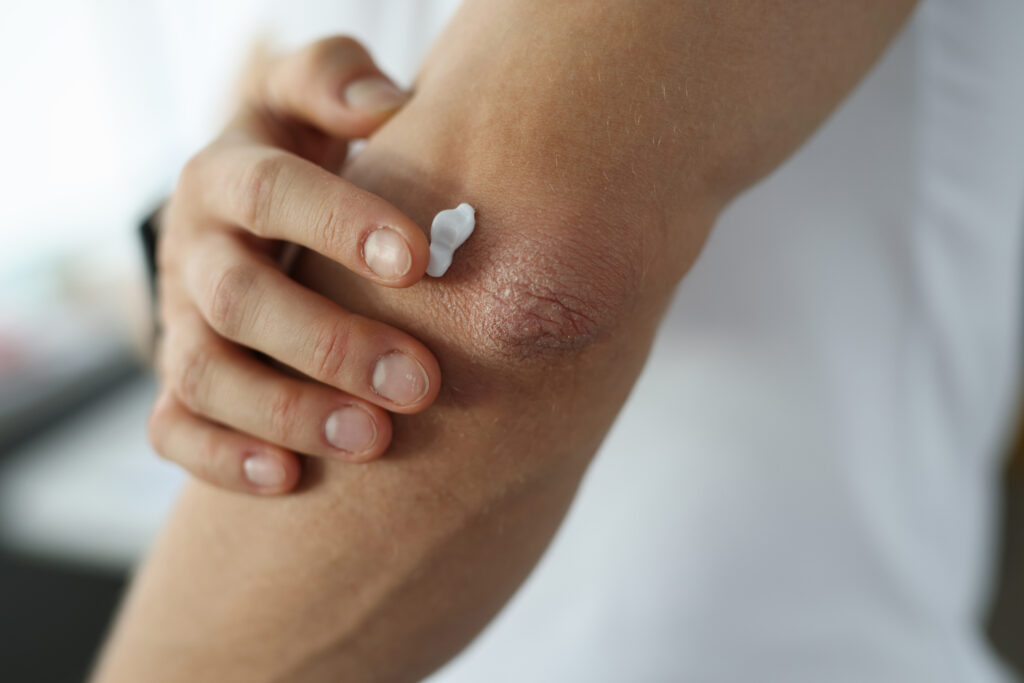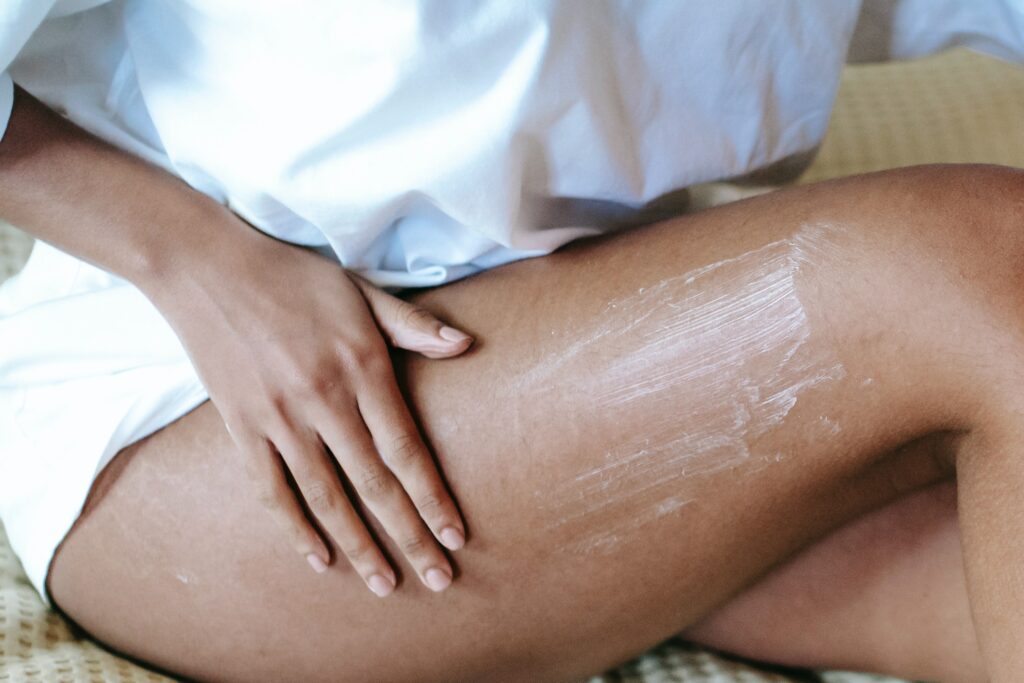Dry Skin
Dry skin is a common condition that makes the skin feel tight, rough, and flaky. If you have dry skin, you can usually both feel it and see it. It can appear anywhere on the body, from the bottom of your feet to the skin on your face, and it has different levels of severity. One person might just have small patches of dry skin on their chin, whereas someone else might experience painful, sore cracks on large areas of their body.
Some people are more predisposed to dry skin – usually because of their genetics, location, lifestyle choices, and age. If you want to fix your dry skin, you must understand the root cause and then learn the best treatments and prevention methods.
Below, you will find everything you need to know about dry skin, from the varying types to when dry skin is a medical concern.
Types of Dry Skin
There are different types of dry skin. One person’s dry skin might not be the same as another’s. To help you understand your skin, consider whether it falls under these categories:
The ‘Dry Skin’ Type
When it comes to skincare, there are various skin types: normal, oily, dry, combination, and sensitive. If you fall under ‘dry’, then you are more likely to need heavier moisturisers and lotions. Finding a quality moisturiser for dry skin usually helps with this dry skin type.
You might have dry skin and fall under ‘combination’ and ‘sensitive’, too. Combination skin means you have both dry and oily skin, while sensitive skin means your skin is sensitive to certain products.
Winter Dry Skin
You might find that your skin changes with the weather and that you only have dry skin in winter. If you don’t wear gloves during the winter, for example, you might experience tight or flaky hands.
If you have winter dry skin, you already know its cause – cold weather and low humidity. This knowledge can help you combat dryness and do the appropriate winter care for dry skin.
Dermatitis
Dermatitis is a skin condition that causes inflamed, itchy patches on the skin. There are various types, including atopic dermatitis (eczema), contact dermatitis, stasis dermatitis, and neurodermatitis.
Dermatitis is usually red, inflamed, and itchy – you might experience dry patches on the scalp or maybe dry skin patches on your legs. If you cannot treat it at home, you will need to seek the help of a doctor or dermatologist to find suitable products. For example, you may seek out a dermatologist-recommended body wash for dry skin.
Psoriasis
Psoriasis is often confused with dermatitis, but it is different. Psoriasis is a skin disease that causes a person to develop thick, dry patches on the skin. They are usually scaly, itchy, and painful.
Psoriasis is common and long-term, affecting around 2 to 3 percent of the world’s population. Most people go through cycles – one month, they might have a severe flare-up, and the next, the dry patches subside significantly.
Dry Skin Symptoms
There are a variety of symptoms of dry skin, and they are listed below. Some symptoms are less severe than others and can be remedied at home. Others might require medical treatment.
- Rough skin
- Skin tightness
- Itching
- Flaking
- Cracked skin
- Redness
- Scaly or flaky skin
- Peeling skin

Dry Skin Causes
Understanding the cause of dry skin is the first step toward combatting it. Here are the most common causes:
Environmental Factors
Environmental factors such as cold weather and low humidity can cause dry skin. Spending too long in the sun can reduce moisture levels in the skin, too, which also results in dry skin. If you live in a hot or cold climate, consider that it’s the environment causing your dryness.
Age
Dryness gets more common with age. You might have had oily skin as a teen, but getting older often turns that around. This is due to several reasons – decreased cell turnover rate, years of sun damage, a change in hormones, and fewer natural oils. For this reason, mature skin tends to need a little more hydration and moisture.
Too Much Heat
Too much heat can cause dry skin because of the reduced humidity. It could be from a hot shower, a long walk in the sun, or spending too long in front of a fire. Minimise time spent in high heated areas to ensure you don’t dry your skin out.
Too Much Water Exposure
Water may be the opposite of dry, but it is a cause of dry skin. If you get your skin wet too often and fail to dry it properly, your skin will suffer from excessive dryness. This is because the water breaks down your natural oils. Avoid spending too much time in water and always use a moisturiser afterward to combat this.
Medical Treatments
Some medical treatments cause dry skin. That includes cholesterol medications, acne treatments, antihistamines, and cancer treatments. Consider that your medication is causing your dry skin. If you suspect as much, you can talk to your doctor to see what can be done.
Deficiencies
Another cause of dry skin is vitamin and mineral deficiencies, in particular – vitamin D, vitamin A, zinc, and iron. Did you know that 17 percent of premenopausal people are deficient in iron? Deficiencies are common. If you think you are deficient in any of these, you can get tested by your doctors.
Skin Conditions
Certain skin conditions can cause skin dryness. Dermatitis and psoriasis are two of the most common dry skin conditions. Both conditions can cause thick, dry skin that may result in cracking. It’s best to get this treated by a medical professional.
Alcohol and Tobacco
Alcohol dries out your skin because it dehydrates you. Smoking also dries your skin out due to the harmful chemicals it contains. Both of these habits also speed up ageing and contribute to many illnesses and diseases, so cutting them out will benefit you all around.
Genetics
A lot of the time, the dry skin condition is simply down to genetics. If your family members all have dry skin, then chances are, you will, too. Plus, you are more likely to have dermatitis if a close family member also has it.
Dry Skin Treatment
If you want to fix dry skin, these tried and tested treatments can help.
Topical Creams, Ointments, and Lotions
Topical creams, ointments, and lotions are great for combatting dry skin. Find the best moisturiser for dry skin with no perfume or parabens, such as the Decubal Basic Original Clinic Cream or Decubal Facial Vital Cream. It’s a simple but effective formula that will make your skin feel much more supple, smooth, and hydrated.
Exfoliation
Exfoliation helps remove dead skin cells that might be contributing to dryness. Try to exfoliate dry skin once a week for best results – any more may dry your skin out. It’s a good idea to use a heavy moisturiser afterward, too, like the Decubal Basic Original Clinic Cream or Decubal Facial Vital Cream.
Prescribed Creams
If your dry skin is because of eczema or psoriasis, you might need a stronger body cream for dry skin or medications to help heal and combat it. You might be prescribed anti-inflammatory creams, antihistamines, or hydrocortisone treatment. These will help with the inflammation and itch, which will, in turn, help your skin to heal.

Dry Skin Prevention
It is always easier to prevent dry skin than it is to treat it. Here are some excellent prevention methods to combat the dryness:
- Drink plenty of water
- Avoid hot showers and baths
- Always dry properly after bathing
- Avoid harsh soaps and skincare products
- Apply moisturiser all over the body
- Protect from harsh weather
- Don’t rub your skin with a towel
- Use a humidifier
- Avoid scratching itchy parts of the skin
- Use oils on your skin
- Build a skincare regime
- Stay out of the sun
These prevention methods will help keep dry skin at bay. Just remember to invest in quality skin products – a good body lotion for dry skin, dry skin serum, or body oil for dry skin can really make a difference. If you’re unsure which products will work for you, speak to a dermatologist.
Risk Factors of Dry Skin
Certain people are more prone to dry skin than others. Here are some of the risk factors for dry skin:
Climates with Low Humidity
Low humidity means low moisture levels in the air, which can quickly lead to dry skin. If you live in a low humid climate, a humidifier can help combat face, arm, leg, and ear dryness
Getting Older
Dry skin becomes more commonplace with age. Adults over forty are more likely to experience excessively dry skin than people in their twenties or thirties. While you can’t turn back the clock, you can treat age-related dry skin with the right skincare products. Finding a hydrating cream for dry skin might really help.
Medical Conditions
Those with certain medical conditions are also at a higher risk of developing dry skin. People who have to take medication for allergies, blood pressure, or cancer, for example, may experience dryness due to the medication.
Those that might have dermatitis and psoriasis are also more likely to have dry skin due to the nature of the conditions. Both skin conditions include flaking, scaly, itchy skin, causing intense dryness.
When to See a Doctor or Dermatologist
It’s important to differentiate between normal, dry skin that can be treated at home and dry skin that requires professional treatment. Here are some signs that you should see a doctor or dermatologist with your dry skin:
- Dry skin happens after medication or treatment
- You experience pain
- You think you have dermatitis, psoriasis, or an infection
- Your dry skin makes you uncomfortable
- Self-care treatments do not work
Dry Skin FAQs
How Do You Fix Dry Skin?
You can use dry skin cream, like the Decubal Basic Original Clinic Cream. If you have excessive dry skin, you may need to seek the advice of a professional. Dry and dehydrated skin can also be fixed by making sure you are drinking enough water, staying out of the sun, and using any prescribed or over-the-counter creams.
How Do You Get Rid of Dry Skin?
It depends on the cause and severity. If you have minimal dry skin due to your skin type or the weather, you can likely get rid of dry skin with moisturisers and creams for dry skin.
Bespoke creams for dry skin, such as Decubal Basic Original Clinic Cream or Decubal Facial Vital Cream, will quickly soothe the symptoms and hydrate the skin.
If the cause of your dry skin is a medical condition, though, you might want to seek the help of a skincare specialist to help clear it up.
What Deficiencies Cause Dry Skin?
The main deficiencies that cause dry skin are Vitamin A, Vitamin D, Vitamin C, Vitamin E, Iron, Zinc, and Niacin.
Can I Have Both Oily and Dry Skin?
Yes – dry-oily skin is called combination skin. If you have both dry patches and oily areas, you have combination skin. Speak to your dermatologist if you’re not sure.
What’s the Difference Between Dry and Dehydrated Skin?
Dehydrated skin lacks water, whereas dry skin lacks oil. Combatting very dry skin often involves using plenty of oils.
What are the Three Types of Dry Skin?
When you have dry skin, you might have either dermatitis, psoriasis, or be experiencing winter dry skin.
Links & Sources
- https://www.psoriasis.org/psoriasis-statistics/
- https://www.cuimc.columbia.edu/news/are-we-underestimating-prevalence-iron-deficiency
- https://www.webmd.com/skin-problems-and-treatments/eczema/colloidal-oatmeal-baths
- https://www.esmiskin.com/blogs/the-difference-between-dry-and-dehydrated-skin#:~:text=While%20dry%20skin%20lacks%20oil,happen%20to%20all%20skin%20types.
No products found